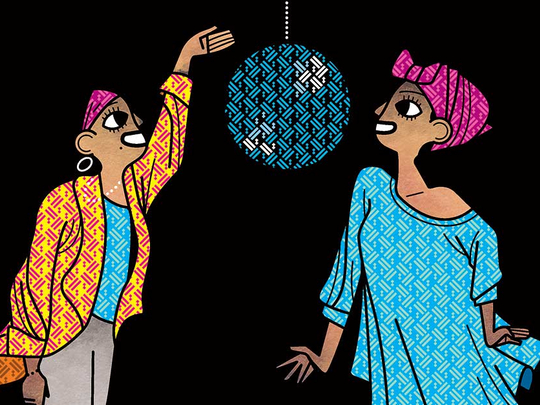
Swing Time
By Zadie Smith, Penguin Press, 464 pages, $27
London in the 1980s: two best friends, with two things in common. The first is their love of dance — one of the girls has talent, the other has flat feet. Both girls are mixed race, but the dynamics of each family are different. The good dancer Tracey’s father is African-Caribbean, her mother white English; the unnamed narrator’s father is white English and her mother African-Caribbean.
These shared backgrounds and desires are what bring the girls together in the school playground and keep them together throughout their growing years. But there are differences, too, between Tracey’s slovenly mother, who buys her daughter mountains of toys and a bed in the shape of a pink sports car, and the narrator’s autodidact mother, who urges self-improvement on her daughter and disapproves of her relationship with Tracey; and between Tracey’s father, who is serving time in prison, and the narrator’s own father, who is kind and unambitious. These subtle distinctions of class and race will drive them apart.
This is the territory of Zadie Smith at her finest. For many, school friendships are the most enduring relationships of our lives; and the nature of those bonds, the trust and mistrust, the kindness and betrayals, the camaraderie as well as the competitiveness, lie at the centre of Smith’s fifth novel, “Swing Time”.
The story opens with a scandal and a public shaming, the modern version of the stocks and whipping post. We are not told what the narrator, alone and estranged from family and friends and from her former best friend Tracey, has done to deserve her fate. From there the novel unspools, moving rapidly back and forth between the girls’ early years and the recent past, to finally reveal the source of the shaming.
The narrator abandons her dancing ambitions early in the novel, though she and Tracey continue to spend their afternoons watching Fred Astaire routines and Michael Jackson videos. Tracey is passionate, fickle, self-deluding (she insists her absent father has been not in prison but on tour with Jackson). Promiscuous, capable of loyalty and thoughtlessness, hard-edged, hard-nosed and hard-working, she enjoys the uncritical support of her single mother.
In contrast, the narrator is less confident than Tracey and as a result less ambitious: a slightly unsympathetic heroine, detached in her relationship with her mother and with men. It is her voice that sets the tone for this measured and ruminative novel.
After her mediocre university career, in which she deliberately failed to gain access to a more prestigious institution in an act of self-sabotage aimed at her mother, the protagonist goes to work as personal assistant to the pop star Aimee. As spirited as Madonna, the singer is a woman of huge energy and energy-sapping ways, who “disliked considering things from too many angles”.
Smith is wonderfully convincing in her portrait of celebrity. Aimee is capable of enormous generosity and of selfishness, possessed of a magpie intellect that descends on the shiniest, brightest and newest idea, and powered by white-hot self-belief.
Says the narrator: “Over 10 years I saw how formidable that will could be, what it could make happen. And all the labour she put into it — all the physical exercise, the deliberate blindness, the innocence cultivated, the very many ways she fell in and out of love — all this came to seem to me a form of energy in itself.”
Soon enough, Aimee decides to build a school in West Africa, a project she conceives and then leaves others to birth and raise. The African country is unnamed, but that it is the Gambia is evident from various clues in the text (“the river split this finger of land throughout its length”) as well as a reference in the acknowledgments.
Smith has clearly done her research but her critique of Western aid policies in developing nations — namely, that financial aid is often ill-conceived, poorly executed and rarely sustained — is scarcely new or unexpected. And nor is it surprising that the narrator’s engagement with a poor African country and the lives of village people will bring about a shift of perspective. “Like passing through the Matrix,” says one character of the journey between New York or London and the Gambian village, a remark picked up and repeated in self-congratulatory style by Aimee, who later marries Lamin, a young Gambian she brings to New York, reversing the journey through the Matrix. “Maybe luxury is the easiest Matrix to pass through,” observes the narrator as she watches the young man adapt to his new circumstances as consort to a star.
But elsewhere “Swing Time”’s Gambian characters, in particular the protagonist’s friend Hawa, resist being defined by the Western gaze. When Hawa marries a travelling Muslim preacher much to the narrator’s dismay, Lamin’s response is that perhaps Hawa’s choice reflects a different kind of freedom, one roaming the land rather than stuck in a village.
Back in London Tracey works hard, wins a part in a musical, beds and discards the male lead. Stripped of the comic qualities of, say, Howard Belsey in Smith’s 2005 novel, “On Beauty”, the characters in “Swing Time” are less likeable; they are deeply flawed and their flaws map on to the course of their lives. Tracey possesses a childlike vindictiveness that causes her to lash out after every disappointment, as when she effortlessly destroys the reputation of an older man who plays piano at the girls’ dance class.
This is a novel as much about failure as about the nature of celebrity. The self-belief that sustains Aimee is not enough to free Tracey, who is possessed of all the same talent and drive, from the constraints of her class, upbringing and education. The narrator, too, is unable ever to find the drive to realise her own talent as a singer and chooses to spend the best years of her life in service to an egotistical star.
Smith touches on many modern societal flash points: Western aid, mother/daughter relationships, childlessness, international adoption, sex tourism, ambition, race, class, cultural appropriation (the girls watch old minstrel shows; Aimee incorporates traditional Gambian dance moves into her onstage routine). It is a novel of breadth rather than depth, which is not to say it lacks insight, far from it, but it did cause me to wonder what kind of reader Smith is writing for. “Swing Time” feels like a novel for people in their 20s, millennials perhaps, who recognise all of these issues but have yet to fully engage with them.
The novel’s strength lies in its unflinching portrait of friendship, driven as much by jealousy and competition as by love and loyalty. Perhaps what lies at the heart of this book is the idea that all relationships are transactional, including even those with the people who should love us the most, and especially between those of unequal wealth. Aimee is scarcely capable of disguising her unbridled desire to possess the newborn child she lifts from the arms of a poor village woman. Asks the narrator: “Did all friendships — all relations — involve this discreet and mysterious exchange of qualities, this exchange of power? Did it extend to peoples and nations or was it a thing that happened only between individuals ... What did I give Tracey? What did Tracey give me?”
–Guardian News & Media Ltd









